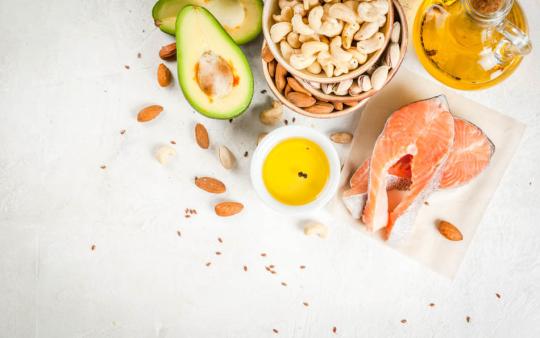The secret’s out: eating the right fats is not only good for your health, it’s essential! We’ve been told for years by low-fat marketing campaigns that fats are the enemy, but the latest science is clear: eating healthy fat does not make you fat. Good fats are essential for your health and play a role in the healthy functioning of our brains, our cardiovascular systems and hormonal functioning, including fertility.
Roughly one in six couples in Canada will experience infertility at some point in their lives. And while infertility is complex and often a result of many medical factors beyond our control, there are environmental considerations like stress, delayed childbearing, environmental toxins, and over-prescribed medications that may be taking a toll on our reproductivity.
Our food choices can make a significant difference in the health and functioning of our bodies. Every meal is an opportunity to flood ourselves with the nutrients we need to thrive and reproduce. And while there is no miracle, one-size-fits-all approach to a fertility diet, nourishing yourself with a wide variety of fresh, whole foods is a great place to start to optimize your overall health and, therefore, fertility.
Fats have important work to do
Believe it or not, our bodies need fat! Every organ and cell in the entire body requires fats in order to function optimally. From a fertility perspective, a variety of different fatty acids are needed to manufacture the cell membranes and hormones which become the building blocks of a healthy brain and nervous system. Even cholesterol is necessary as a precursor to sex hormones and in the production of cell membranes.
Good fats also support the digestive system by allowing absorption of certain fat-soluble vitamins and minerals. Vitamin D, for example, essential for ovulation, is fat-soluble, meaning you need to consume fat in order for it to be absorbed.
Get your Omega-3s!
Omega-3 fatty acids are a special class of fats necessary for fertility. As essential fatty acids (meaning your body needs them but can’t make them), omega-3s support ovulation, sperm production, and blood flow to the reproductive organs. Omega-3s are also powerful anti-inflammatories and can help combat the inflammation that is believed to play a significant role in infertility. The best sources of these fats come from sardines, mackerel, anchovies, and wild salmon. Supplementation with high-quality fish oil may be necessary if you aren’t eating those fish twice a week.
Which fats are for me?
If you were hoping that French fries and doughnuts were going to make the list of fertility-friendly fats, consider your bubble burst! The cheap, rancid, heavily-processed fats used in fast food and convenience foods are harmful to your reproductive system by way of free-radical damage, inflammation, disrupted gene expression, and hampered hormone and metabolic function. Clear your cupboards of these fats!
Fats to avoid:
- Canola oil
- Corn Oil
- Vegetable Oil
- Sunflower Oil
- Safflower Oil
- Soybean Oil
- Margarine
- Trans Fats
- Hydrogenated or partially-hydrogenated oils
Instead, fill your pantry with good, heart-healthy fats, many of which you can get from these nutrient-packed superfoods. Make sure to include good-quality fat into your daily routine. Consider some of these delicious options!
Fats to include:
- Coconut Oil
- Extra Virgin Olive Oil
- Avocados and Avocado Oil
- Organic butter and ghee (in moderation)
- Full-fat fermented dairy products like cheese, yogurt, and kefir (in moderation)
- Pasture-raised, organic eggs
- Pasture-raised, organic meats (in moderation)
- Wild salmon, anchovies, sardines, and mackerel
- Chia seeds
- Hemp seeds
- Flax seeds and flax oil (not for cooking with)
- Walnuts
- Almonds
- Cashews
- Brazil Nuts
- Sesame seeds
- Pumpkin seeds
- Sunflower seeds
Try not to stress too much about living perfectly. The goal is to strive for a healthier, whole foods diet that includes more plant-based proteins and healthy fats. A treat now and then isn’t the end of the world if your dietary habits are largely healthy. Living well is all about balance, after all!
Now that you know all about healthy fats, check out our complete guide to fertility-boosting nutrition.
*Originally published October 31, 2017









